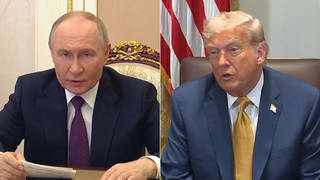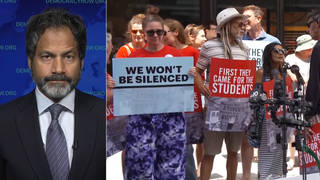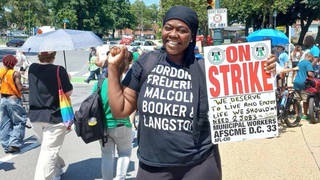
Topics
Guests
- Emily Kunstler and Sarah Kunstlerco-directors of the new documentary William Kunstler: Disturbing the Universe. They run Off Center Media, a production company that produces documentaries exposing injustice in the criminal justice system.
A new documentary looks at a man once described as the most hated and most loved lawyer in America: the late William Kunstler. We play excerpts of William Kunstler: Disturbing the Universe and speak to the film’s co-directors, Kunstler’s daughters Emily and Sarah Kunstler. [includes rush transcript]
Transcript
JUAN GONZALEZ: We turn now to a look at a new documentary about a man once described as the most hated and most loved lawyer in America: the late William M. Kunstler. He is the subject of a new documentary directed and produced by his daughters, Emily and Sarah Kunstler.
EMILY KUNSTLER: Growing up, it seemed like my father was at the center of everything important that had ever happened. He fought for civil rights with Martin Luther King, Jr. and represented activists protesting the Vietnam War. When the inmates took over Attica Prison or Native Americans stood up to the federal government at Wounded Knee, they asked my father to be their lawyer.
When he spoke about his past, he was like a hero from legend. His clients were fighting to change the world, and Dad was fighting to keep them out of jail. My sister and I weren’t around for our father’s glory days. Sarah was born in 1976, when Dad was fifty-seven. I came along two years later.
AMY GOODMAN: An excerpt from the new documentary William Kunstler: Disturbing the Universe, narrated by his daughter Emily Kunstler. The film opens on Friday at Cinema Village in New York.
The film’s directors, Emily and Sarah Kunstler, join us here in our firehouse studio. They’re the founders of Off Center Media, a documentary production company that exposes injustice in the criminal justice system.
We welcome you both to Democracy Now! Tell us about what made you decide to do this film about your famous father.
EMILY KUNSTLER: Well, you know, Sarah and I got to a point in our lives, in our late twenties, when we thought it was the right time to look back and think about legacy and our influence, and it seemed natural to investigate the choices that our father had made.
AMY GOODMAN: Talk a little, Sarah, about your father. You, too, went the route of, well, training to be a lawyer, though you decided to go into film?
SARAH KUNSTLER: Yeah. Well, I actually — I do also practice criminal law. Our father was around — well, it seemed, when we were children, that he was at the center of everything important that had ever happened. He worked with Martin Luther King, Jr. He defended Freedom Riders, the Chicago Eight, the inmates at Attica Prison, the American Indian Movement at Wounded Knee. He just seemed to be everywhere. And those were our bedtime stories, this kind of heroic past that our father had led. And when we were children, he spent most of his time close to home in New York doing criminal cases and representing people accused of violent crime.
JUAN GONZALEZ: So the decision to actually go — because there have been some films that have been made of him, the decision to make this personal story, how did you reach that?
SARAH KUNSTLER: Well, I think that it was part of an investigation that Emily and I had to go through anyway. He passed away when we were teenagers, and that kind of arrested our relationship. We didn’t get to kind of sit across a table with him and see him as an adult and a flawed person and a human being and saying, you know, “I’m OK with you, you’re OK with me,” the kind of — I think the natural progression that happens with parents, as we get older. So the film was a way for us to do that. It was a way for us to look at his life and to see what we take from him.
AMY GOODMAN: Emily, chronicle your father’s life for us briefly. Talk about those cases that you’ve just referenced, but maybe people, especially young people, aren’t even familiar with, how your father rose to prominence and the cases he took on.
EMILY KUNSTLER: Well, you know, he started his career as a movement lawyer in the South representing the Freedom Riders. And —-
AMY GOODMAN: They were…?
EMILY KUNSTLER: The Freedom Riders would ride buses across state lines and try to integrate the lunch counters at different bus stations across the country and risk arrest. And this was a real -— seeing the Freedom Riders risk arrest and brutality really had a big influence on our father. It made him realize that it was the action that really had meaning, that you could sit around and talk all you want, but that it was really putting your life — being willing to put your life on the line that made a difference. So that really changed the course of his life.
And then, after that, he went on to represent people protesting the war in Vietnam, the Berrigan brothers and the Catonsville Nine, when they burned draft cards with napalm.
And then he’s most famous for his defense of the Chicago Eight and then the Chicago Seven, ultimately, after they were arrested for protesting the Democratic National Convention in 1968. So, that really brought him to national prominence.
AMY GOODMAN: I wanted to go back to the film William Kunstler: Disturbing the Universe and play an excerpt that deals with one of the most controversial cases your father, William Kunstler, took on in the 1980s.
EMILY KUNSTLER: When I was ten years old, I remember pleading with him not to represent a teenager accused of a gang rape. But once his mind was made up, nobody could stop him.
C. VERNON MASON: Central Park jogger case was a case in which a white female was beaten severely in Central Park, and there were a number of young black youth who were arrested.
EMILY KUNSTLER: The defendants were not that much older than me or Sarah, but it felt like worlds apart.
JIMMY BRESLIN: They were black kids from 110th Street. And they were perfect: throw them away. I mean, what is it? Of course they did it.
RON KUBY: A pack of youths, out on a night of wilding, savagely beat and rape a helpless young jogger. They’re all arrested. They’re called a wolf pack. And everybody hates these kids. And they confess.
MICHAEL RATNER: And the atmosphere in the city was these guys are dead guilty, before trial. Donald Trump had put a full-page ad in the Times saying they should get the death penalty.
MAYOR ED KOCH: To understand is to forgive. I don’t want to understand what motivates someone to engage in this kind of horror. I want — rather than to understand him, I want him punished.
WILLIAM KUNSTLER: May it please the court, my name is William Kunstler, and I am arguing for Yusef Salaam. This is the first of the so-called Central Park jogger cases. And we have three issues before the court…
EMILY KUNSTLER: Yusef Salaam became his obsession. For two years, Dad wrote appeal after appeal and finally lost when New York’s highest court affirmed the conviction. I was mad at him for taking this case.
AMY GOODMAN: An excerpt from the documentary William Kunstler: Disturbing the Universe. Well, Bill Kunstler died in 1995 at the age of seventy-six. Seven years after his death, there was a startling development in the Central Park jogger case.
BRIAN WILLIAMS: You may remember a famous case here in New York. It was called the Central Park jogger attack. And back in 1989, it stunned this city — the nation, really — and resulted in the arrests of five teenagers. Now it turns out they apparently got the wrong guys. And today New York prosecutors moved to have all the guilty verdicts set aside.
EMILY KUNSTLER: Yusef Salaam spent seven years in prison and was exonerated in 2002.
YUSEF SALAAM: I was that person who was the worst person that ever lived, who needed to be disposed of. People wanted us to be hanging from the tree by the end of the day. To me, the trial wasn’t just in the courtroom. The trial was also on the train going to the courtroom. It was walking around my neighborhood on the weekends. It was walking around anywhere, you know. And I was very recognizable. I was always on trial.
EMILY KUNSTLER: I think Dad always believed in Yusef’s innocence. But I’ve realized it was never about innocence for Dad. He looked at Yusef and saw a kid who had been convicted by public opinion, and by his own daughters, before the case ever went to trial.
YUSEF SALAAM: The legacy that Bill Kunstler has left is his fights and his struggles were — or became also my fights and my struggles. You know, anytime you have injustice or anytime you’re faced with any kind of injustice and you’re in a position to do something, you have to do something.
EMILY KUNSTLER: I remember my father telling us that all white people are racist, including me and Sarah. But I didn’t understand what he meant at the time. He meant that we are blind to the depth of our own prejudice and that as long as there is prejudice, there can be no such thing as a fair trial.
WILLIAM KUNSTLER: And that’s the terrible myth of organized society, that everything that’s done through the established system is legal, and that word has a powerful psychological impact. It makes people believe that there is an order to life and an order to a system and that a person that goes through this order and is convicted has gotten all that is due him, and therefore society can turn its conscience off and look to other things and other times. And that’s the terrible thing about these past trials, is that they have this aura of legitimacy, this aura of legality. I suspect that better men than the world has known, and more of them, have gone to their deaths through a legal system than through all of the illegalities in the history of man.
AMY GOODMAN: William Kunstler in the film William Kunstler: Disturbing the Universe. You now do your Q-and-As after the film this weekend, Cinema Village, with Yusef Salaam.
EMILY KUNSTLER: Mm-hmm.
AMY GOODMAN: Your thoughts now?
EMILY KUNSTLER: You know, that’s been one of the great gifts of making this film, as it’s given us the opportunity to reconnect with Yusef. You know, we doubted Yusef’s innocence back when we were children, so to be able to share this experience with him, to share the film with him, to give him the opportunity to stand before an audience as an exonerated person has really been, you know, a blessing.
AMY GOODMAN: He’s a hospital administrator now?
EMILY KUNSTLER: He is. He’s a hospital administrator. He has four daughters. He’s doing wonderfully. And, you know, he really enjoys speaking to young people and educating people about his experience.
JUAN GONZALEZ: Of course, that Central Park jogger case was our Scottsboro Boys. It was really — or the Sleepy Lagoon case in Los Angeles in the 1940s. It was everyone, or I’d say 99 percent of the people in the city, including myself, because I sat through that trial, and I heard the confessions and I was convinced they were guilty, as well. To find out later on what had happened and how prosecutors had totally failed to really investigate the case properly was an amazing turnaround, I think. And there are still many people in the city who refuse to believe the injustice that was created by the prosecutors there.
But, you know, listening or watching your father again — you know, he was my attorney at one time also. In 1969, he defended me and a group of Columbia students who were on trial for contempt of court, did a passionate defense in the trial. He lost the case, and we all ended up spending thirty days in jail as a result. But we always — it was worth it just to be able to see him in a courtroom and the respect that the judges showed to him. Not merely those who attended, but the judges themselves knew they were before a legendary figure, and they treated him with a deference and a respect that they wouldn’t give to a normal criminal defense attorney or political lawyer. And so, he really was one of the towering figures in American criminal defense in this country.
AMY GOODMAN: I wanted to go now to another excerpt of your film, William Kunstler: Disturbing the Universe, the documentary, featuring archival footage of the two of you, Emily and Sarah Kunstler, confronting your father on live TV about his work.
EMILY KUNSTLER: I had always defended my father to the kids at school. This time, I couldn’t find the words. But Sarah confronted him on local television.
SARAH KUNSTLER: I was kind of wondering if ever you decided to take a case and then later, you know, did a double take and said, “Well, you know, this isn’t — I shouldn’t be doing this. This isn’t something, you know, that in my heart I believe is right”?
WILLIAM KUNSTLER: There have been a few times where I would want to get out of a particular case. That’s true. But on the other hand, I always had the feeling that once you’re in it, that you shouldn’t leave it, unless something climactic…
EMILY KUNSTLER: He never gave us a straight answer. And I decided I was never going to be like my father.
EMILY KUNSTLER: Well, I don’t to be a lawyer.
SARAH KUNSTLER: Me, neither.
NEW YORK 1 NEWS INTERVIEWER: Well, if you’re both committed to change, at least this point, committed to changing things, if you’re not lawyers, what do you think is the best vehicle to do that, to carry that out?
SARAH KUNSTLER: Well, some people act, and some people defend them. And maybe we’re just people of action.
AMY GOODMAN: OK, there you are, saying you both don’t want to be a lawyer. But there you are, Sarah. You’re a lawyer.
SARAH KUNSTLER: I know. And it was committed to tape, and now I’m sharing it with the world. So I have to deal with it. But —-
AMY GOODMAN: But, I mean, I think that’s the power of the film, is the honesty in it, every which way. I mean, you’re critical of your father, and you talk to people who were critical of him. And you talk to the people who worked alongside him and feel, without your father, so many of these cases would not have gotten attention.
SARAH KUNSTLER: Yeah. Well, there’s no question that this is a film made with love and that this is, in a sense, a love letter to our father. But it’s also a critical inquiry. We didn’t want to -— we didn’t want to make a puff piece. We wanted to look at him honestly and seriously and come to terms with his life.
AMY GOODMAN: We have a last SOT that we want to play — that’s, for viewers and listeners, “sound on tape” — asking about your father representing AIM, the American Indian Movement. This excerpt features interviews with singer and activist Harry Belafonte and AIM leader Clyde Bellecourt.
CLYDE BELLECOURT: “We’re going to put the government on trial,” he said. “It’s not the Indian people that are on trial; it’s the government,” he said. “And they’re the ones that we’re after. They’re the ones that are going to be found guilty.” He prophesized that.
HARRY BELAFONTE: When Bill asked me to come, he had extended the invitation at the same time to a colleague of mine, Marlon Brando. When we met before going into the court, he says, “We have arranged seats where you will be sitting directly behind Dennis Banks and Russell Means, and make sure that the jury gets full awareness of the fact that you really like these guys and admire them and you’re there to support them.” And I said to Bill, then I said, “But Bill, if you’re asking us to sit there and to do that to influence the jury, isn’t that jury tampering?” He said, “Everything is jury tampering that goes on in a courtroom.”
AMY GOODMAN: That’s Harry Belafonte. How has this making of the film changed you, Emily and Sarah?
EMILY KUNSTLER: Well, you know, it really brought our father back to life in a lot of ways for us. When he passed away, we were teenagers, so we never had that opportunity. It also – you know, we realized somewhere along the way that our search for consistency, looking for the black-and-whites, trying to find, you know, some sort of clear answer, was inherently flawed and that, you know, it is our inconsistent moments that brings about change and that makes us human. So we certainly learned that along the way.
AMY GOODMAN: Well, we want to thank you both for being with us. Emily and Sarah Kunstler, good luck on your film coming out. It’s going to show in New York Cinema Village, and then it’s traveling around the country.













Media Options